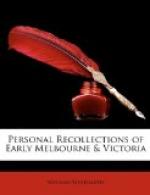Premiers came in thick and fast succession in those days, for there was no small doing and undoing, and no little of general upturning when an exclusively representative Assembly took the place of the “Crown” system, in its preceding complete or subsequently still partial condition. The Land Question was ever the chief difficulty, for, whereas in previous times the people had been directed to conform themselves to land laws, now the new fancy all was that the land laws should conform to the needs of the people. Ministries rose and fell mainly on this question. When the second time Premier, I think in 1860, Nicholson left his name to a Land Act, as did O’Shanassy, Gavan Duffy, and others, and there is a ringing of the changes even yet upon that fertile subject.
William Nicholson has passed to his rest, and Burns might have fitly awarded him his high palm, “An honest man’s the noblest work of God.”
CHARLES HOTSON EBDEN, ESQUIRE.
“But I thought there was more in him than I could think.” —Coriolanus.
“Methinks there is much reason in his sayings.” —Julius Caesar.
“All work and no play makes Jack a dull boy.” The subject of this sketch might put in a claim for at least something towards redeeming Jack’s dulness, for he had a few odd ways, and a fertile turn for epigrammatics, some of them not bad. He boasted of having Beau Brummell’s antipathy to certain vegetables. During the early but brief allotment mania he said that he feared he was to become “disgustingly rich,” one of his epi’s which became a by-word, and scored him a decided success. When some colonist, hearing him called by the name of Ebden, asked him if he was related to “the great Mr. Ebden,” his humorously-delivered response, to the effect that he was himself that happy individual, scored him another, perhaps smaller, success. I have often seen him score yet another, which, perhaps, in his own view, was not at all the least of that sort of thing, when, after writing in a rather neat and most distinct hand, the pen seemed suddenly under paralysis, and a sadly dilapidated signature was the result. He always signed his name in that fanciful way.
Ebden’s name was so well known in the earlier years—indeed his gait and ways, his sayings and doings were so marked throughout—that to omit him from my list would leave a decided blank. But if the man had consisted of these little oddnesses just alluded to, whether first class or second, little would have survived of him, as business-like John Bull fails to appreciate people who have no more solid backing than that. Underneath all this very gauzy surface, Ebden, as all who had his intimacy were aware, was withal a man of ability and good common sense, and, what was practically more, he was reputed to rank high in the role of success in the early allotment rig. Indeed, in the rapid fortune-making of that time, he contemplated a palatial residence for himself upon




